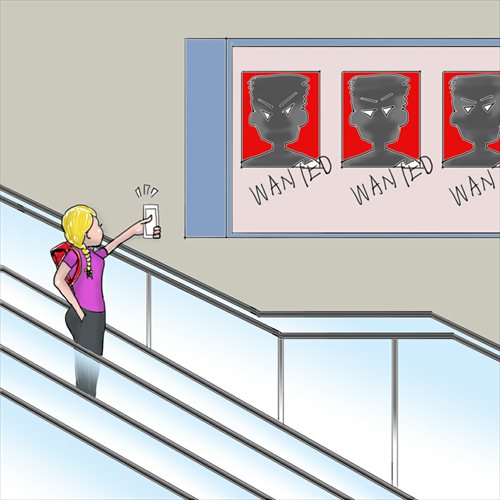Name-and-shame campaign for foreigners? businesses?

Illustration: Lu Ting/GT
Would seeing your name, photo and personal information electronically displayed on a giant LED screen in a very public setting convince you to pay off an outstanding loan or make good on a string of unpaid fines? The Shanghai Railway Transportation Court thinks so, and is gambling that such social shaming will force defaulters and scofflaws into paying their outstanding debts.
The plan, which involves broadcasting at Shanghai's two biggest railway hubs the names of individuals and companies with court judgments against them, is an example of innovation in the areas of debt collection and judicial activism. "Name and Shame" initiatives have been used with varying success in other countries, usually to address gaps in the enforcement of food and drug regulations, bylaw infractions and to address petty crimes.
In Shanghai, the plan is to put the names, addresses, identity card numbers and even photos of debtors on full public display in an attempt to place face-losing social pressure on offenders. The campaign will only apply to those who have had their debts registered and a court order issued to enforce the debt, so issues of fairness would have already been addressed during the judicial process.
It nonetheless raises concerns about the effect this might have on the relatives of those subjected to the unwanted publicity. Broadcasting the real addresses and identity numbers of debtors could tangentially expose them to fraudulent activities by unscrupulous schemers or creditors who might take advantage of a person or entity perceived to be in financial trouble.
Another unforeseen effect of name and shame punishments is that when previously attempted in other countries, such as Australia and the UK, this approach has actually ended up exacerbating the problem rather than alleviate it. It became a kind of badge of honor for degenerates, especially vandals and graffiti artists, who take immense pride in being publicly named.
Appearing on the board at Hongqiao Railway Station could well become an aspiring criminal's "progress chart" for their career in petty crime. Likewise, it's conceivable that publicity hounds (e.g. wannabe social media celebrities) who wish to obtain a public reputation may take a bizarre comfort in topping the list. One wonders, however, how effective such a strategy might be, seeing as how hardly anyone ever lifts their eyes from their smartphones. How many preoccupied travelers actually stop to read LED broadcasts?
Legal eagles and judicial activists have noted that such endeavors rarely become standard practice due to the costs and logistics of continuously updating such a database. The actual statistical effects are also largely unknown due to a lack of research in this esoteric field. In most cases the primary outcome is nothing more than a public relations storm.
Underlying the effectiveness of such measures is always public confidence in the integrity of the process that has led to a conviction on debt matters in the first place. The more confident the public is in the impartiality of the process, the more cooperative and accepting Shanghai residents will be of such unusual steps.
Ironically, the one area that name and shame policies toward debtors could be a very effective tactic in China might be foreign-owned companies that try to escape financial obligations or penalties within their business sphere. China's international community is small enough that individuals tend to be personally known or recognized by each other in social or business settings, i.e. six degrees of separation.
Even in the highly competitive Shanghai business culture, there is a heightened psychological adherence to the notion of being a good guest and playing by the rules. Foreign corporate debtors who ignore their obligations and responsibilities may suddenly find their carefully crafted public relations image undermined by a news item featuring their name lit up in foot-high letters during the busy Shanghai commuting times. In this regard, I say let the naming and shaming begin!
The opinions expressed in this article are the author's own and do not necessarily reflect the views of the Global Times.